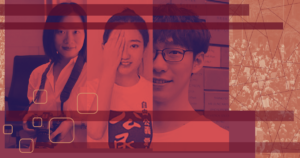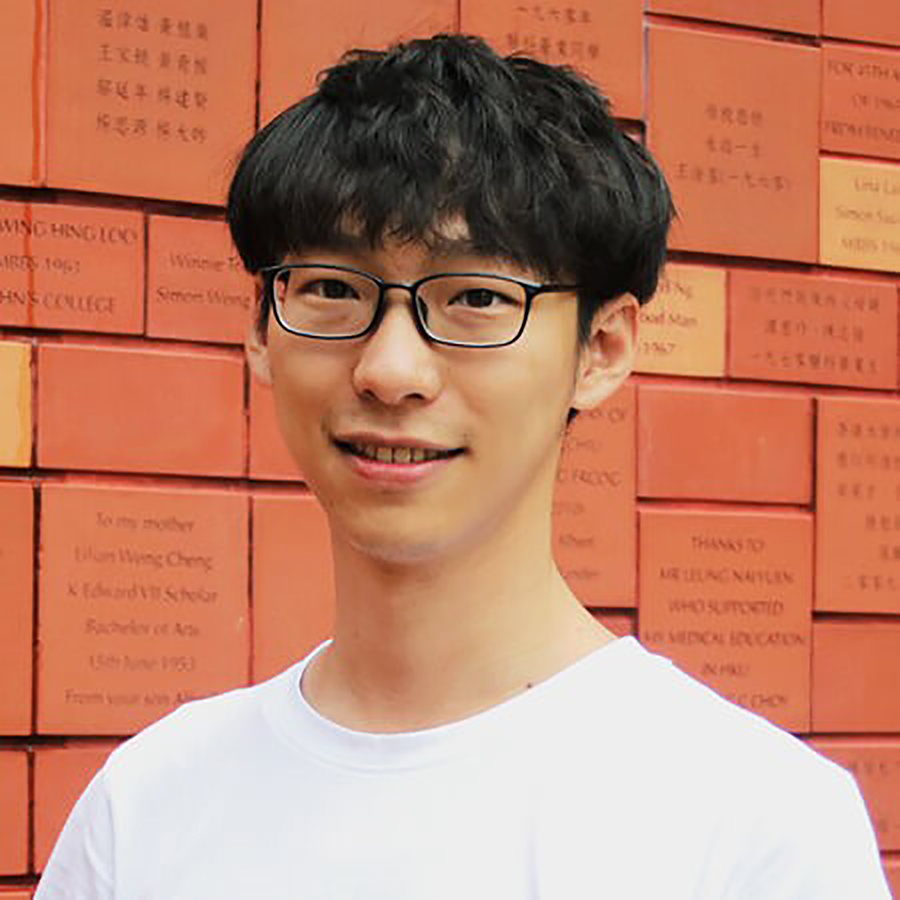Against the Current, No. 218, May/June 2022
-
Out of the Imperial Order: Chaos
— The Editors -
"Nationtime": The Black Political Convention
— Malik Miah -
Rising Up at Amazon
— Dianne Feeley -
Book Banning Past and Present
— Harvey J. Graff -
Punishing the Criminalized Sector of the Working Class
— James Kilgore -
The Invisible Chinese Activists
— Mo Chen -
Feminism(s) in Mexico
— Margara Millán -
Faiz Ahmed Faiz: The Restless Traveler
— Ali Shehzad Zaidi -
The Complete Rosa Luxemburg
— William Smaldone interviews Peter Hudis - Revolutionary Experiences
-
Introduction to Revolutionary Experience
— The Editors -
On-the-line in Auto -- 1970s-1990
— Elly Leary -
Organizing in '70s Wisconsin
— an interview with Jon Melrod - Reviews
-
Prison Abolition: A Primer
— Efrén Paredes, Jr. -
How Alice Became an Activist
— Adam Schragin -
When Radicals Ran the U.S. Congress
— Mark Lause -
Dust Bowl Chronicler
— Cassandra Galentine -
Surveying Revolutionary Thought
— Herman Pieterson
Mo Chen

DISCUSSIONS ON CHINA on the international Left have decidedly become more state-centric amid the escalating US-China conflict. China is regularly discussed as if the Chinese state and society are the same thing, or the Chinese state represents the general interest of the Chinese people. This has become a barrier to developing a critical understanding of China in solidarity with its labor and social movements.
This conflation is a rather recent phenomenon. Until a few years ago, the Left was far more interested in the workers’ movement in China, and in building solidarity with labor activists. Instead, today’s state-centric discussions function to direct attention away from analysis of social movements from below that arose in response to social polarization.
We cannot feign complete ignorance of the social movements and activists. They have been written about by activist themselves and researchers, and reported on in mainstream international media. There is no excuse, and we need to shift the perspective back to the concrete movement organizing on the ground in China, and identify with their experiences rather than that of the state.
In particular, I want to center the young Chinese activists who have become doubly invisible by their employers and by the state, and are at risk of being made invisible a third time on the international Left.
Many of the young Chinese social movement activists today have either been radicalized during or later inspired by the diverse social movements that emerged in a period of deepening capitalist development in the 2000s and 2010s. Young people began to engage in grassroots organizing, ranging from feminist, environmental and anti-discrimination to labor.
It was by no means a golden period, since activists were arrested and organizations were shut down, too. But a liberal period of politics allowed rights-based as well as more radical form of social activism to develop, as long as it did not directly and explicitly challenge state power.
A key dividing line is 2015, the year when hundreds of labor, feminist and human rights activists and lawyers, not just individuals but now whole networks got swept up in highly coordinated crackdowns. This reflected a nervousness on the part of the Chinese state, worried that networks of activists would take advantage of any emerging social crisis amid China’s economic slowdown and threaten political stability.
A chilling period ensued where surveillance and harassment of activists became more serious as well as more sophisticated, as state resources were poured into crushing dissent.
This is the context in which the social movement activists operate in today. Despite this harsh reality, we see activists continue to push boundaries and explore possibilities.
In what follows, I present the snapshots of just three young Chinese activists.
The Rise of #Metoo

In 2017, during the early days of China’s #metoo movement, a young journalist Xueqin Huang conducted a survey of female journalists in China on their experiences of sexual harassment. She had been troubled by the stories she heard from female journalists of harassment by their bosses, fellow journalists and others.
Out of more than a dozen of journalist friends and colleagues she asked informally prior to the survey, only one of them unequivocally stated no experience of harassment. The survey received over 400 valid responses, and more than 80 percent reported various forms of sexual harassment. A majority had chosen silence and tolerance of harassment.
Xueqin sent the published survey results to more than 30 media companies across China in the hope of raising the alarm on the epidemic of sexual harassment. Not only was there little response but in the Chinese domestic media there was also media blackout of this survey.
Earlier in 2015, feminist activists already mobilized to raise awareness of sexual harassment and were arrested for a planned street protest days before the International Women’s Day. Despite this, the growing movement encouraged many women to come forward to talk about their past instances of sexual harassment which they had kept silent for many years.
Xianzi is among a small but vocal group of women, from college students, activists to employees, who did raise their voice about sexual harassment in a very public manner. In 2018, Xianzi penned an essay online, detailing her experience of sexual harassment four years before.
While an intern at the national broadcaster CCTV, she was called into a makeup room in the office building and sexually harassed by one of the most prominent Chinese television hosts who had manufactured a positive public image. A visit to the room by another worker allowed Xianzi to escape, and she reported the case the next day to the police who summarily dismissed the case and persuaded her to not pursue it further.
The accused not only refused to acknowledge anything happened, but sued Xianzi and a friend of Xianzi who had been supporting her for defamation in August 2018. This prompted Xianzi to file a counter lawsuit. During her first court experience in 2020, hundreds of supporters showed up for hours in the cold northern Chinese winter.
In 2021 the court ruled against Xianzi, citing insufficient evidence. Xianzi has vowed to appeal to the court decision.(1)
Exposing Labor Abuse
In late 2017 an accidental deadly fire on the outskirts of Beijing killed 19 people at a low-rent apartment building that primarily housed China’s own internal migrant workers. The Beijing municipal government reacted by demolishing apartments deemed risky and evicting tens of thousands of migrant workers from Beijing from their places, leaving them nowhere to stay in the winter.

Qiaochu Li is one of many volunteers and organizations who documented what was happening and provided information to migrant workers about job opportunities and affordable places to stay.(2)
Qiaochu has studied labor at university, and worked as a research assistant on labor-related projects at a Chinese university. She is deeply engaged in labor rights as well as feminist issues. In the early days of the pandemic in 2020, she joined with other volunteers to distribute masks to sanitation workers who lacked protective equipment.
Realizing also that domestic violence could be on the rise while everyone is locked down at home, she and others raised this issue online and spread information on the prevention of domestic violence.
Qiaochu is one of many young students drawn to the cause of labor rights for China’s vast number of internal rural migrant workers over the past 20 years.
Fang Ran was another young student who became a researcher on China’s labor movement, not out of pure academic interest, but rather genuinely inspired by workers’ struggle. He is one of many Chinese college students who have been radicalized and dedicated to supporting workers and other marginalized groups.

While still in college, Fang Ran co-founded the Research Association of Political Economics and Modern Capitalism, a Marxist student society that is distinct from the Chinese state’s Marxism. He has actively participated in student and labor activism for several years.
Some students “industrialized,” going into factories for years to organize workers.(3)
In response to the radicalization on some university campuses, the government and universities have tightened their grips on teaching and liberal and leftist student clubs, shutting down Marxist-related societies or at the very least replaced the radical student leaders with loyalist students.
Activists’ Lives and Politics
The snapshots of these young Chinese activists can capture only a tiny part of their life stories and activism, not even scratching the surface of the movements in which they have been a part.
Their politics diverge, ranging from what we recognize as left liberals to Marxists. Because the ideological space in China remains distorted by the presence of the CCP and its persistent claim to represent Marxism, any deviation from that ideology, even in mild forms, could be considered as threatening. Just as threatening is any attempt to reclaim Marxism and left politics.
We learn of these activists either because their case has become very public for which they have suffered at considerable personal costs (Xianzi), or because they have been arrested and remain in detention with little communication with the outside world (Xueqin, Qiaochu and Fang Ran).(4)
Xueqin was arrested twice in 2019 and again in 2021, Fang Ran was arrested in 2021, and Qiaochu was arrested multiple times over recent years (as much as for her own activism and vocal criticism of the authorities as for her support for her partner, who is a prominent, imprisoned human rights activist).
All of them have remained in some form of government detention with limited communications with the outside world. We know more and more details about their stories often because friends and families have been writing about them since their arrests. They have now become invisible.
Responding to the Pandemic
Despite the grim reality, there has been signs of hope.
In the early months of the pandemic in 2020, there was a limited revival of activism, largely an outburst of spontaneous mutual aid initiatives that tapped into preexisting activist networks as well as completely new grassroots mobilization. That is when the Chinese authorities were underprepared for the pandemic response, and people were mostly left to their own to protect themselves and each other.
The chaotic first few weeks, in particular, offered a space for people to organize out of necessity and out of social solidarity to support each other. It is not the first time that disasters unleashed spontaneous actions from below for self and mutual protection. The social mobilization during the massive Sichuan earthquake of 2008 elicited an outpouring of grassroots efforts to support people affected by the earthquake, following several years of civil society building.
In the early months of the pandemic, too, all sorts of mutual aid initiates sprang up in China: some are entirely spontaneous efforts by ordinary residents volunteering their time, while others drew from preexisting activists and their networks.(5) Limited advocacy works also temporarily resumed around labor protection, for instance, of medical workers who needed protective gears and sanitation workers who similarly didn’t have enough masks at the beginning.
Feminist activists organized around domestic violence that spiked during the early months of the lockdown in Wuhan and other areas in China, and LGBTQ activists focused on the specific needs of LGBTQ people such as access to medications.
Citizen journalists — ordinary citizens with no journalistic training but took on themselves to write about social issues — collected information and came to do their own reporting on what was happening, believing the authorities were not telling the truth, a view shared among ordinary people at the time.
All this revived grassroots activism was important in providing immediate support to people in need. While unfortunately it did not last very long before the state stepped in to quash grassroots efforts, this was a crucial experience for many people to get a taste of grassroots activism, and for more experienced activists to develop their work and renew their commitment.
For its part, however, the Chinese state appears more confident of its social control mechanisms and capacities, having used the pandemic responses to implement and extend its abilities.
Discontent and Future Prospects
Against arguably the worst political repression that young social movement activists are facing and with many arrested or otherwise put under tight surveillance, what is the prospect of a new generation of young activists emerging?
There are odds to overcome. Repression has closed down grassroots organizations which until recently provided opportunity and space for young people to learn about organizing and advocacy.
These organizations were by no means without problems: some may lean too much on advocacy and less on organizing and mobilization in their communities. As imperfect as they were, they served as a training ground and jumping board for young activists. Absent of them and under pressure, young activists are often on holding patterns.
This is why the early pandemic months in China were a critical time for many activists to have some space to breathe and organize. But activists have adapted too by not relying on organizations, and instead constituting themselves as networks that allow individual activists to take initiatives while coordinating and collaborating with others in the networks.
Against these obstacles, there are structural reasons why young people are likely to be more active. As with their counterparts in much of the world today, there are simmering discontents among young Chinese.
The deepening capitalist development that delivered higher salaries and improvement in people’s lives over the last three decades, including rural migrant workers, has generated conflicts and contradictions in both the economy and society that can no longer be ignored and are acutely experienced by young people.
One example is that in 2019, a nationwide online mobilization by tech company workers protested against the very toxic work culture of very long work hours and excessive overtime.(6) It forced open a very public conversation about work culture that garnered sympathy well beyond just tech workers.
But this sense of discontent among young Chinese is not just over the extremely competitive nature of their work. It’s also a sense of stagnation which reflects their class experience.
The term that suddenly became widely popular in 2020 is “involution,” an obscure academic term which means in certain agricultural societies there is growth without development.(7) In the Chinese context, however, this term took on the meaning of working hard — putting in more and more hours into work to get ahead — but not seeing the outcomes of their efforts.
This points to a rising, if still very rudimentary, class consciousness among young Chinese workers based on their lived class experience. The development model, which many believed would continue to deliver more material benefits and social advancement, seems running out of a steam, something that the Chinese state too clearly recognized and is now trying to address.
But it’s not simply that the economy has been growing at a significant lower pace compared to a decade ago or so ago. It is also a result of the symptoms of China’s breakneck capitalist development — runaway inequality, the pricing out of young people from the real estate market, the sense of lack of control over their work and life, becoming appendages to the (computer) machine.
In some respects, young people are beginning to see their conditions not as isolated, individual experiences but as shared class experience even though not been explicitly framed in class language.
Some have been drawn to labor because of the recent protests by food and parcel delivery workers who work for e-commerce and logistics companies.
As is the case globally, platform economy has been booming in China, employing millions of logistics workers, many of whom are rural migrant workers who left the factories. Their conditions, consistent with their counterparts elsewhere in the world, have been highly precarious, subject to work intensification, declining incomes due to cuts to their piece rates and being prone to work injuries on the road.
Delivery workers autonomously organized a number of protests and strikes,(8) maintained their own networks online and offline, and a leadership was slowly emerging (one of the most prominent organizers who established a mutual support network for delivery workers and came out strongly in support of their rights was arrested in February 2021, but is widely believed to have been released in late 2021 without trial).(9)
This leaves us with a mixed picture for activism in China. State repression has devastated activists, their organizations and networks. Those not arrested are tightly monitored, and regularly harassed and warned to stay away from activism. Yet activists are still around and when there is a space for activism they have showed up and rapidly mobilized.
Even more encouraging is that more and more people are less content with the capitalist development model in China. Until 2019 and 2020, public discussion and activism around labor rights have been muted because of the previous crackdown. Then all of a sudden we saw first the discussion around work culture among white-collar workers, and then public interest in delivery workers.
Open dissent can still be contained to a quite extraordinary extent in China, but the underlying discontent cannot be so easily eradicated. For the international Left, the more we learn about these movements and activists in China and the conditions that drive young people to express their discontent, and the more we see them as part of a global shared struggle, the better chance we have of building a global progressive movement.
Notes
- https://lausan.hk/2021/censorship-china-metoo-movement/
back to text - https://madeinchinajournal.com/2018/05/17/beijing-evictions-a-winters-tale/
back to text - https://madeinchinajournal.com/2020/06/25/leninists-in-a-chinese-factory/
back to text - https://madeinchinajournal.com/2020/06/25/leninists-in-a-chinese-factory/
back to text - https://lausan.hk/2020/mutual-aid-and-the-rebuilding-of-chinese-society-part-1/
back to text - https://jacobinmag.com/2019/05/tech-workers-chinese-solidarity-microsoft-github
back to text - https://chuangcn.org/2021/05/involution-wildcat-on-chinas-2020/
back to text - https://clb.org.hk/content/food-delivery-workers-take-action-against-low-pay-and-%E2%80%9Ctyrannical%E2%80%9D-policies
back to text - https://labornotes.org/2021/04/china-leader-delivery-riders-alliance-detained-solidarity-movement-repressed
back to text
May-June 2022, ATC 218

